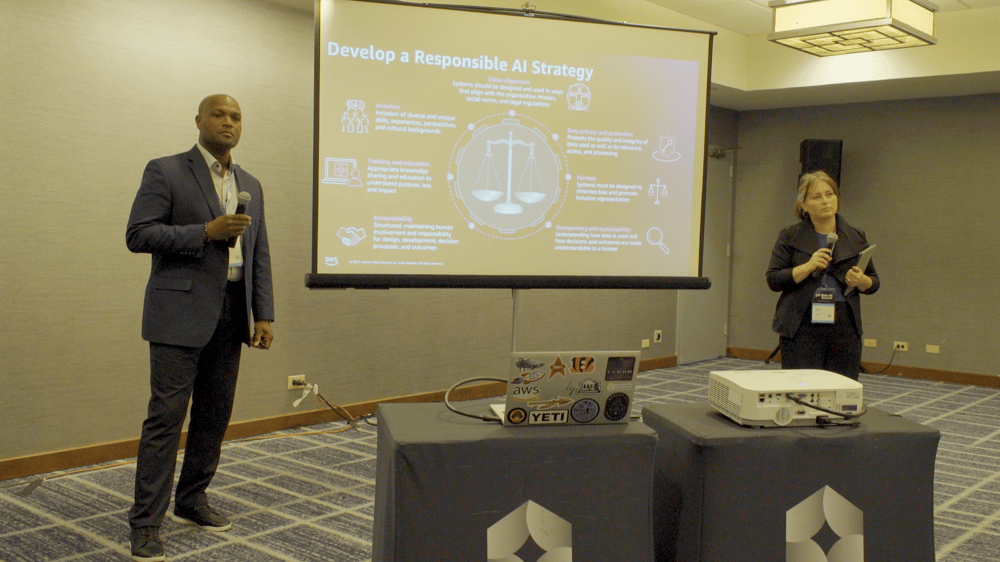Transforming Local Government for a Smarter Future with AWS
Modev News VOICEandAI gnrt 24-04-16 Modev Staff Writers 4 min read

Unlocking the Power of Artificial Intelligence
As artificial intelligence (AI) and machine learning (ML) continue their rapid evolution, local governments are beginning to take notice. At GovAI 2023, Jason Dunn, an executive government advisor with Amazon Web Services (AWS), and Erin McKinney, a policy council on the state and local education policy team at AWS, led an engaging discussion on how AI and ML are transforming the public sector.
Jason Dunn brings over 20 years of experience in the public sector to his role at AWS, having previously served as the chief information officer for the city of Cincinnati, Ohio. As for Erin McKinney, with her background in corporate tax planning and four years at AWS, she provides valuable insights into the company's initiatives in the AI and ML space.
Growth, growth, and More Growth
The session opened with a thought-provoking statistic from 2020:
71% of AI and ML adopters expected to increase their investment in the near term.
While this percentage might appear lower than expected, it suggests that the adoption of these technologies has grown significantly in recent years. AI and ML are not just solutions looking for problems; they are powerful tools that can address specific business challenges faced by government agencies, such as enhancing citizen service delivery, automating simple tasks, and improving operational efficiency. No wonder it's on a sustained path towards growth.
As the conversation progressed, several use cases where AI and ML are making a tangible impact in the public sector were highlighted. Text generation and extraction, for example, can help agencies process vast amounts of documents and records more efficiently. Object detection in video surveillance footage is another area where AI excels, allowing cities to monitor hundreds of cameras without relying solely on human eyes. Generative AI takes this a step further by creating actionable outputs based on the analyzed data.
Ethical Considerations
The discussion also touched on the ethical and responsible deployment of AI and ML technologies. Jason outlined four key pillars that guide these conversations:
- Economic value proposition: This involves evaluating the value and risk of investing in AI technology. Organizations need to consider the potential rewards and risks from a financial perspective when deciding whether to adopt an AI solution.
- Moral philosophy: Different cities, states, or organizations may have varying perspectives from their leadership on what AI should be used for, both internally and externally. Aligning the moral aspects of how AI will be deployed is an important consideration.
- Legal considerations: Evaluating what is legal regarding AI use cases is critical. Existing laws and regulations, such as data privacy protections, need to be taken into account. Organizations are looking at how AI fits into current legal frameworks.
- Ethical implications: In addition to what is strictly legal, organizations must also consider AI systems' ethical implications and potential biases. Developing responsible AI strategies requires a deep understanding of the technology's capabilities and limitations. Inclusive policy development with diverse stakeholders is important for addressing ethical concerns.
He also stressed the importance of aligning organizational policies with the capabilities and risks associated with AI and ML adoption.
Responsible Deployment
Drawing upon her experience reviewing over 1,400 pieces of legislation related to AI and ML, Erin emphasized the need for state and local governments to ensure that these tools are deployed responsibly. As such, when developing new frameworks for AI and ML governance, it becomes critical to consider existing laws and regulations, such as HIPAA and state-level data privacy protections.
When the audience raised thought-provoking questions about the potential for regulation to hinder innovation and the challenges of aligning technology implementation with policy adherence, Jason didn't flinch. He acknowledged the friction that can arise between IT professionals and legal experts. However, that only further emphasizes the need for inclusive policy development and a deep understanding of the technology's capabilities and limitations.
Real-world examples of AI and ML in action engaged the audience. Using non-emergency chatbots in 911 call centers, which can help triage calls and reduce wait times during staffing shortages, was particularly captivating. As was the success story of the Los Angeles County Public Defender's Office, which used AWS AI and ML tools to digitize and classify 160 million records, eliminating the need for manual scanning and data entry.
Other notable use cases included Virginia Beach's stormwater management system, which utilizes IoT sensors and AI to send notifications when floodwaters reach critical levels, and Portland State University's enrollment assistance program, which leverages student data to provide personalized degree path recommendations.
Wrap Up
The session was very much "hands-on," and concrete use cases were the star of the show. Throughout the session, Jason Dunn and Erin McKinney stressed the significance of focusing on specific problems and use cases rather than getting swept up in the excitement surrounding AI and ML. And they encouraged attendees to work with partners to explore proof-of-concept projects.
They also emphasized the value of resources like AWS's AI and ML use case explorer, which showcases various applications of these technologies across different sectors, such as government, education, health and human services, and transportation. This tool allows organizations to identify potential use cases relevant to their specific challenges and goals.
By sticking to concrete issues and forging partnerships that allow them to pool their resources, public sector organizations can effectively harness the power of AI and ML to drive innovation and improve services for their constituents.
As the public sector continues to embrace AI and ML, it's clear that this tech has the potential to revolutionize how local governments serve their constituents. By prioritizing responsible deployment, inclusive policy development, and a problem-centric approach, agencies can harness the power of AI and ML to create a smarter, more efficient future for all.